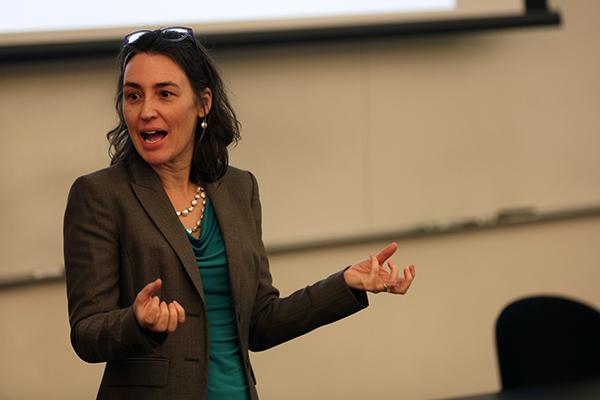Updated: Feb. 18, 2015 at 1:59 p.m.
Students looking to become environmental policy advocates could soon earn a combined five-year bachelor’s and master’s degree from GW.
The science and environmental resource policy programs developed a proposal this year for a joint program that would allow students to earn both degrees. The proposal, which is now going through the final step of University review and could be approved within the coming months, comes as GW has built up environmental studies-related courses in different departments.
Nancy Augustine, a professor of public policy and public administration, said the degree was proposed after 13 environmental studies undergraduates said they would be interested in a joint program if GW offered one. She said about 81 percent of seniors majoring in environmental studies said they probably would have applied if the program had existed when they were juniors.
“Even if it ends up to be a small cohort of students, then it would be a good thing,” Augustine said.
A new five-year program could help GW grow its revenue base at a time when crunched budgets across the University have forced cutbacks. Administrators have encouraged academic departments to create new programs, especially online, to bring in more revenue from tuition.
Faculty hope to start accepting applications for next fall within the next few months. Right now, 23 graduate students are enrolled in the graduate environmental resource policy program, a number faculty members hope will grow.
“We hold them to a higher level of understanding of all of the issues,” Augustine said. “The undergraduate major in environmental studies is very strong, but we’re able to explore more sophisticated economics, law and environmental science.”
Students would start to take courses that would double as graduate courses during senior years. Several of GW’s colleges, including the School of Engineering and Applied Science, offer classes that count toward the environmental studies major. Those courses used to be marked by a green leaf icon in GW’s print bulletin.
Professors in the undergraduate environmental studies program worked with the geography department, which houses that program, to line up the courses and credits for the combined degree.
To apply for the new program, students would need a 3.5 GPA within the major and a 3.4 average overall. Students wouldn’t have to take the GRE, though they would need to submit letters of recommendation.
Nathan Cogswell, a second-year environmental resource policy student, said he didn’t major in environmental science as an undergraduate, but that science and policy can be incorporated into other majors.
“My degree was in political science and I had a concentration in public policy, so I learned the general topics such as interest groups and elections,” he said. “All of it combined in policy studies, and the sciences gives you a strong interdisciplinary approach into environmental issues.”
Carlos Villacis, a first-year environmental resource policy student, said he has flexibility in choosing electives, whether he takes courses in the Elliott School of International Affairs or in SEAS.
The master’s program allows students to study in multiple schools because most incorporate environmental science and teach areas that pertain to policy, he said.
“I was interested in the program because when I was applying to grad schools, I had to decide if I wanted to get an environmental science or policy degree, and I thought this was a nice mix since they teach you the policy and science aspect,” Villacis said. “It will leave me literate in both. I can discuss science with the scientists and policy with the policymakers.”
More departments have floated five-year programs as a way to help students earn a master’s degree more quickly and increase graduate program enrollment. Both the GW School of Business and the School of Media and Public Affairs offer five-year programs that retain undergraduates as graduate students.
The Graduate School of Education and Human Development has considered offering a five-year program so students can more easily earn teaching certification.







